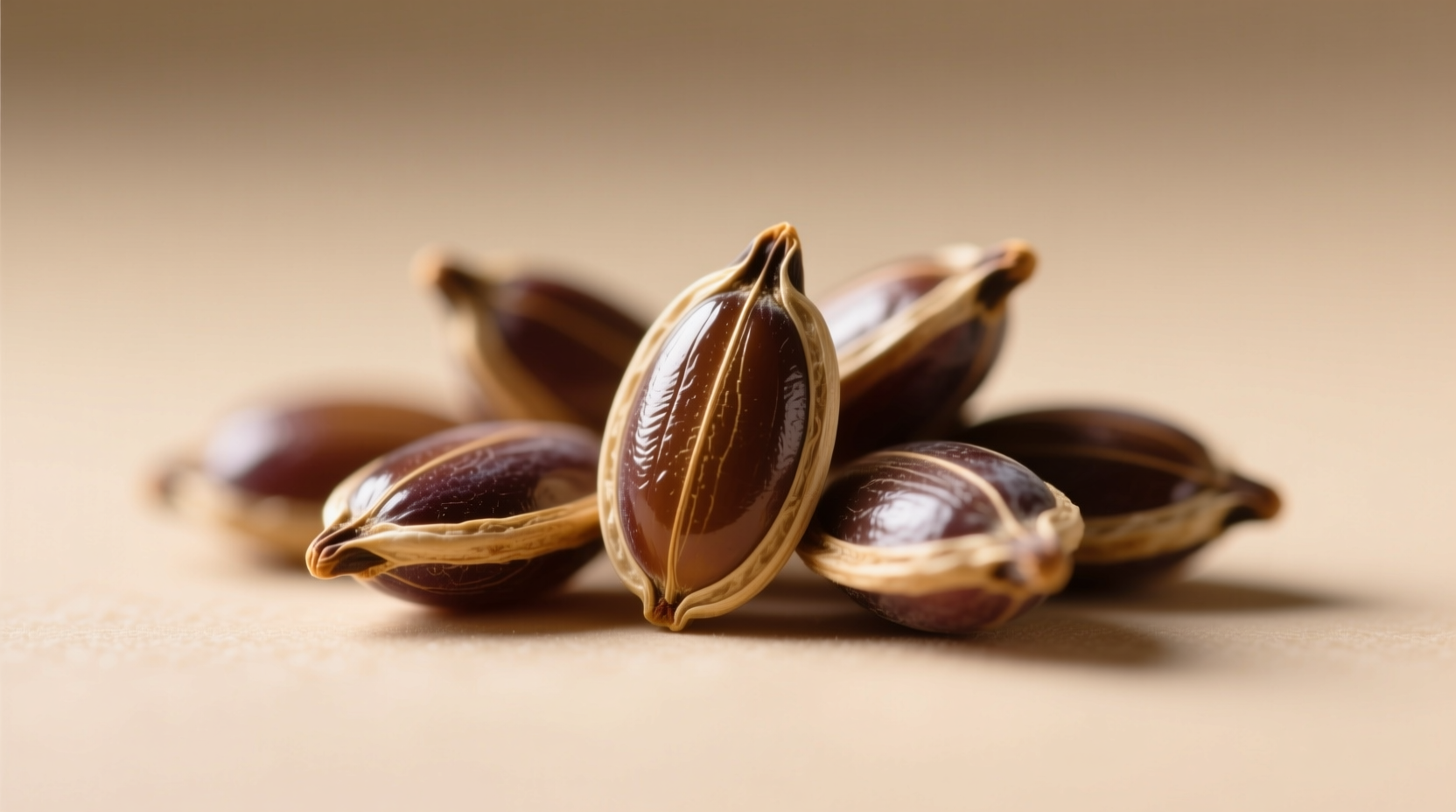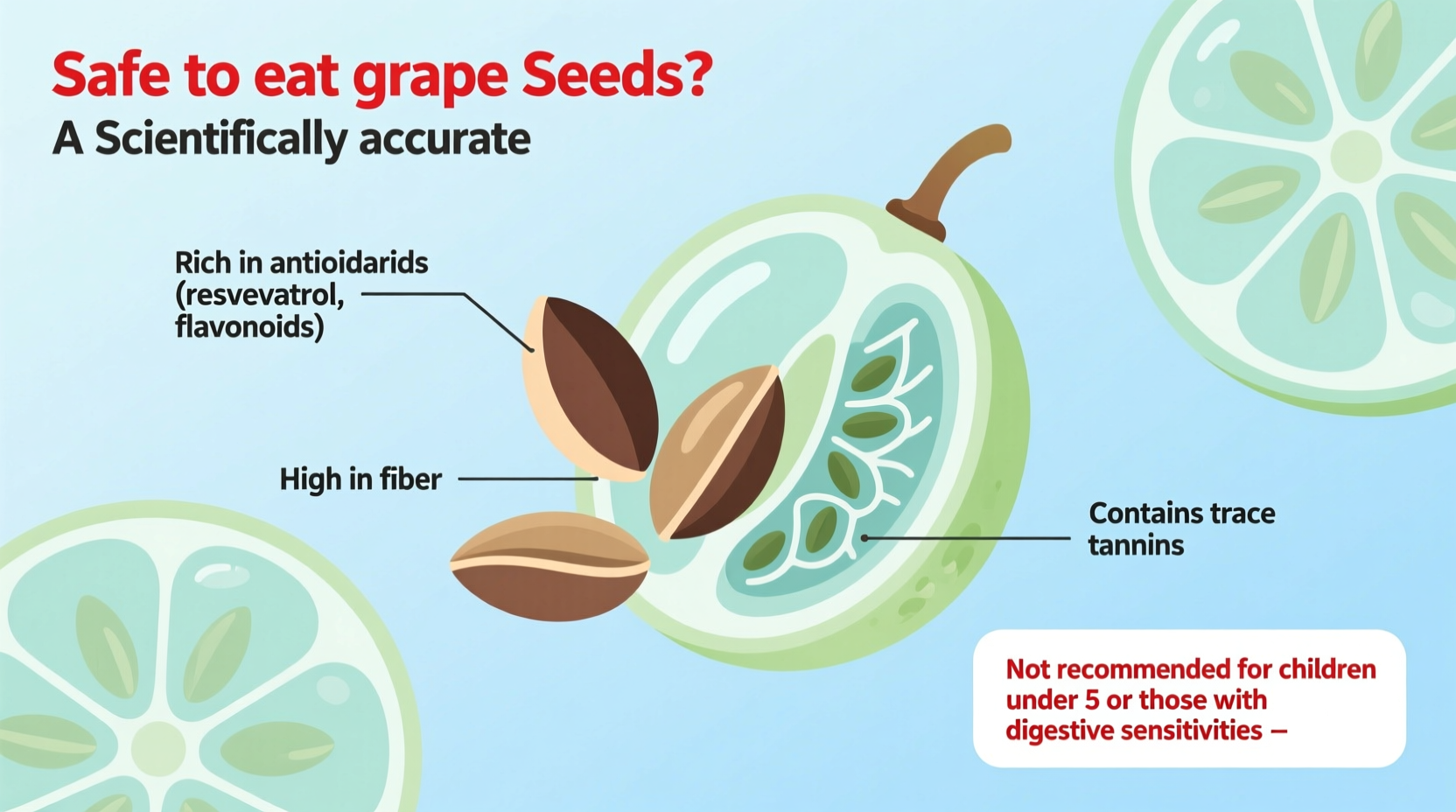Ever wondered what happens if you accidentally swallow grape seeds while enjoying your favorite fruit? You're not alone. Many health-conscious consumers question whether these tiny seeds hidden inside grapes are safe to consume or if they harbor hidden dangers. Let's explore the science behind grape seed safety and separate fact from fiction.
What Exactly Are Grape Seeds Made Of?
Grape seeds contain several beneficial compounds that contribute to their nutritional profile. Unlike the seeds of some fruits like apples or cherries, grape seeds don't contain cyanogenic compounds that could release cyanide when metabolized.
| Nutrient | Per 100g of Grape Seeds | Primary Benefit |
|---|---|---|
| Proanthocyanidins | 4-10% | Powerful antioxidants with anti-inflammatory properties |
| Dietary Fiber | 20-25g | Supports digestive health and regularity |
| Linoleic Acid | 55-75% | Essential omega-6 fatty acid |
| Vitamin E | Moderate levels | Antioxidant protection for cells |
Data source: USDA FoodData Central
Addressing Common Safety Concerns
Let's examine the most frequently asked questions about grape seed consumption based on current scientific understanding.
Digestive Impact of Grape Seeds
While grape seeds are completely non-toxic, their hard outer shell makes them difficult to fully digest. Most people will pass them unchanged through their digestive system. Some sensitive individuals might experience mild gastrointestinal discomfort when consuming large quantities of seeds.
"Grape seeds don't contain harmful compounds, but their fibrous nature means they pass through the digestive tract largely intact," explains Dr. Elena Rodriguez, a nutritional scientist at the National Institutes of Health. "This isn't dangerous but could cause temporary bloating in people with sensitive digestive systems." (NIH Study on Grape Seed Components)

Choking Hazard Considerations
The primary safety concern with grape seeds involves young children. Due to their small size and hard texture, grape seeds could potentially pose a choking hazard for children under 4 years old. Pediatric guidelines generally recommend removing seeds from fruits given to toddlers and young children.
Evolution of Grape Seed Research
Research on grape seeds has evolved significantly over the past two decades:
- Early 2000s: Initial studies focused on extracting compounds from grape seeds for supplements
- 2010-2015: Research expanded to examine antioxidant properties and potential cardiovascular benefits
- 2016-2020: Studies investigated anti-inflammatory effects and potential applications for metabolic health
- 2021-Present: Current research examines sustainable uses for grape seed byproducts in food industry
Source: National Center for Biotechnology Information review of grape seed research
Practical Guidance for Grape Consumers
Understanding when to remove seeds and when it's perfectly fine to eat them can help you make informed choices:
Who Should Be Cautious About Eating Grape Seeds
Certain individuals might want to remove seeds before consumption:
- Young children: Under age 4 due to choking risk
- People with digestive disorders: Those with IBS or diverticulitis may prefer seedless varieties
- Denture wearers: Hard seeds can be uncomfortable to chew
- Those with chewing difficulties: Medical conditions affecting chewing ability
Grape Seeds vs. Grape Seed Extract
It's important to distinguish between eating whole grape seeds and consuming concentrated grape seed extract supplements:
- Whole grape seeds: Contain fiber and compounds in natural proportions, generally safe to consume
- Grape seed extract: Highly concentrated form used in supplements, may interact with medications
The Mayo Clinic notes that while eating grape seeds poses no known risks, concentrated grape seed extract supplements "may interact with blood thinners, aspirin, and other medications that affect blood clotting" (Mayo Clinic).
Debunking Common Grape Seed Myths
Several misconceptions persist about grape seeds. Let's clarify the facts:
- Myth: Grape seeds contain cyanide like apple seeds
- Fact: Grape seeds do NOT contain amygdalin, the compound that releases cyanide in some other fruit seeds
- Myth: Grape seeds can cause appendicitis
- Fact: No scientific evidence supports this claim; appendicitis has multiple complex causes unrelated to seed consumption
- Myth: Grape seeds provide significant nutritional value when eaten whole
- Fact: While nutritious, the hard seed coat prevents full nutrient absorption from whole seeds; most benefits come from processed extracts
Final Recommendations for Safe Consumption
Based on current scientific understanding, here's how to handle grape seeds:
- For adults: Enjoy grapes with seeds without concern; they're safe and contain beneficial compounds
- For children under 4: Remove seeds to eliminate choking risk
- For digestive sensitivity: Choose seedless varieties if you experience discomfort
- When juicing: Seeds can be included as the juicing process breaks them down
- For maximum benefit: Grape seed extract supplements offer concentrated benefits but consult your doctor first
Remember that individual reactions can vary. If you experience persistent digestive issues after consuming grape seeds, consider removing them from your diet and consult a healthcare professional.
Frequently Asked Questions
Can swallowing grape seeds cause appendicitis?
No, scientific research shows no connection between grape seed consumption and appendicitis. This is a common myth with no medical evidence to support it. Appendicitis develops from various factors unrelated to seed consumption.
Are grape seeds toxic like some other fruit seeds?
Unlike apple or cherry seeds, grape seeds do not contain amygdalin, the compound that can release cyanide. Grape seeds are completely non-toxic and safe for human consumption.
Do grape seeds offer any health benefits when eaten whole?
While grape seeds contain beneficial antioxidants, the hard outer shell limits nutrient absorption when eaten whole. Most health benefits come from processed grape seed extract. Whole seeds primarily contribute fiber to your diet.
Should I remove grape seeds before giving grapes to my toddler?
Yes, pediatric guidelines recommend removing seeds from fruits given to children under 4 years old due to choking hazards. Seedless grapes are the safer option for young children.











 浙公网安备
33010002000092号
浙公网安备
33010002000092号 浙B2-20120091-4
浙B2-20120091-4